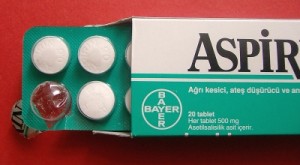



Surviving AmericanSurviving
American Medicine
 It is common to use aspirin to reduce the risk of cardiovascular disease. One baby aspirin a day is taken by millions of Americans to help to reduce or delay the occurrence of heart attacks. About 25% of Americans take daily aspirin (E. Jacobs and coauthors, J. National Cancer Institute August 10, 2012).
It is common to use aspirin to reduce the risk of cardiovascular disease. One baby aspirin a day is taken by millions of Americans to help to reduce or delay the occurrence of heart attacks. About 25% of Americans take daily aspirin (E. Jacobs and coauthors, J. National Cancer Institute August 10, 2012).
Recent information indicates that aspirin can also reduce the risk of certain cancers (reviewed in Science 2012; 337: 1471). The use of aspirin was found to be associated with reduced risk of colon or rectal cancer by 24%, and reduced death rate from colon or rectal cancer by 35%. A follow up study also indicated that there was a 21% reduction in risk of dying not only from colorectal cancer, but also other gastrointestinal cancers, including esophageal cancer, stomach cancer, pancreatic cancer, lung cancer and prostate cancer. There is also a suggestion that aspirin may reduce the risk of breast cancer and lung cancer. The overall death rate from cancer is 16 to 37% less if people are taking aspirin daily for 5 or more years (according to E. Jacobs).
The risks of aspirin, although small, are potentially serious. Patients who take aspirin should watch out for bleeding. If you are taking aspirin, your physicians should be watching to see if you are having increased gastrointestinal bleeding. Rare patients are allergic to aspirin.
If you are taking aspirin as a part of your daily health regimen, consider the following:
– Ask your doctor about your risk of developing a serious cancer
– If you are at risk of gastrointestinal cancers, colon cancer, lung cancer, breast cancer, or prostate cancer, discuss with your physician whether aspirin might be useful
– If the physician does not know, consider getting a second opinion from a physician who is familiar with aspirin benefits in cancer risk reduction
– Discuss with your physician whether you have conditions or diseases that might make aspirin therapy more dangerous
For more information about how to discuss disease prevention with your physician, see my new book Surviving American Medicine.
Recent Posts
- The Big Sick Receives Dr. Presant’s HOME Award on the Red Carpet
- Dr. Cary Presant Presents Best Health Themed Film Award to The Big Sick On the Red Carpet
- Dr. Presant Awards Health Oriented Motion-picture Excellence (HOME) Award for 2017 to The Big Sick
- Birth Control Pills Increase Cancer Risk: How You Can Lower Your Risk
- What motivates your doctor in providing you medical care
Recent Comments
Archives
- March 2018
- December 2017
- September 2017
- May 2017
- February 2017
- December 2016
- October 2016
- August 2016
- July 2016
- April 2016
- February 2016
- January 2016
- December 2015
- October 2015
- September 2015
- July 2015
- April 2015
- February 2015
- January 2015
- December 2014
- November 2014
- October 2014
- September 2014
- August 2014
- July 2014
- June 2014
- May 2014
- April 2014
- March 2014
- February 2014
- January 2014
- December 2013
- November 2013
- October 2013
- September 2013
- August 2013
- July 2013
- June 2013
- May 2013
- April 2013
- March 2013
- February 2013
- January 2013
- December 2012
- November 2012
- October 2012
Categories
- academy awards
- Affordable Care Act
- Aging
- Alcoholism
- alternative medicine
- American Cancer Society
- Angelina Jolie
- Arnold Palmer
- arsenic
- bariatric surery
- best film
- blood clots
- breakthrough drugs
- Breast Cancer
- Cancer
- cancer prevention
- Cancer Treatment
- Casey Kasem
- Celebrities
- cervical cancer
- Chemotherapy
- cholesterol
- clinical trials
- Conflict of Interest
- CT scans
- diasaster
- Doctors
- Drug Cost
- Drug interactions
- Drug Side Effects
- Ebola
- elderly patients
- Electronic Medical Records
- emergency care
- Fatigue
- Festival of Books
- films
- Fiscal Cliff
- fran drescher
- Gene Testing
- Gene Wilder
- geriatrics
- Guidelines
- Health Care
- Health Insurance
- health-themed movie
- Healthcare Reform
- Heart disease
- Hillary Clinton
- Hospitals
- HPV
- illness
- Jaclyn Smith
- lung cancer
- Medical Tips
- Medicare
- Medication
- Medicines
- Melanoma
- Michael Douglas
- movie
- movies
- new years resolutions
- Nurse practitioners
- Obamacare
- Obesity
- osteoporosis
- Ovarian Cancer
- Physician Communication
- Physician Reimbursement
- Preventing infections
- Prevention
- prostate cancer
- psychosocial well-being
- ptsd
- sleep apnea
- Smoking
- Star Wars
- statins
- stroke
- sunscreen
- Supplementation
- Supreme Court
- surgical complications
- Surviving American Medicine
- terrorist attack
- Toxins
- Uncategorized
- Vaccines
- Vitamins
- What to Do
- Wrinkles

